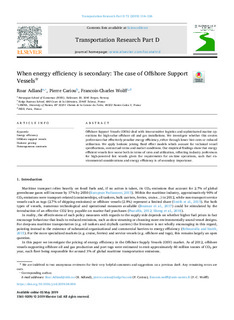When energy efficiency is secondary: The case of Offshore Support Vessels
Journal article, Peer reviewed
Published version
Permanent lenke
http://hdl.handle.net/11250/2631550Utgivelsesdato
2019Metadata
Vis full innførselSamlinger
- Articles (FOR) [100]
- Publikasjoner fra CRIStin (NHH) [249]
Originalversjon
Transportation Research Part D: Transport and Environment. 2019, 72 114-126. 10.1016/j.trd.2019.04.006Sammendrag
Offshore Support Vessels (OSVs) deal with time-sensitive logistics and sophisticated marine operations for high-value offshore oil and gas installations. We investigate whether this creates preferences that effectively penalize energy efficiency, either through lower hire rates or reduced utilization. We apply hedonic pricing fixed effect models which account for technical vessel specifications, contractual terms and market conditions. Our empirical findings show that energy efficient vessels fare worse both in terms of rates and utilization, reflecting industry preferences for high-powered fast vessels given the requirements for on-time operations, such that environmental considerations and energy efficiency is of secondary importance.

